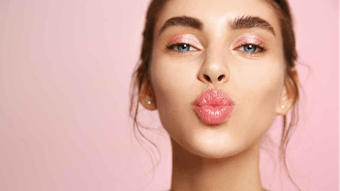
 F-1. Top reasons U.S. consumers purchase sun protectionEuromonitor
F-1. Top reasons U.S. consumers purchase sun protectionEuromonitor
Euromonitor International’s “Voice of the Consumer: Beauty Survey,” fielded June-July, 2023, reveals a clear desire for healthy skin among U.S. respondents, with the top reasons for purchasing sun protection being “skin care as an important priority” (27%; F-1) and “addressing specific skin concerns” (25%).
Top Sun Care Skinification Drivers
 F-2. Euromonitor International’s “Voice of the Consumer: Beauty Survey” found a higher number of U.S. respondents searching for multifunctional attributes in sun care in 2022 and 2023 than in 2021Euromonitor
F-2. Euromonitor International’s “Voice of the Consumer: Beauty Survey” found a higher number of U.S. respondents searching for multifunctional attributes in sun care in 2022 and 2023 than in 2021Euromonitor
Skinification is being driven by the growing demand for multifunctional products, as consumers no longer want to choose between sun protection and skin care; they want both in one easy step. In fact, Euromonitor International’s “Voice of the Consumer: Beauty Survey” found a higher number of U.S. respondents searching for multifunctional attributes in sun care in 2022 and 2023 than in 2021 (F-2)—a trend expected to continue in the future.
As a result, there has been a noticeable rise in the incorporation of skin care benefits into sun protection, such as those that improve the overall skin microbiome.
Common Multifunctional Sun Care Claims & Ingredients
 Historically, sun care was primarily used to shield against UV rays and avoid sunburn, but with growing skin health awareness among consumers, demand is rising for products that provide more than just protection. This trend is also known as “skinification.”
Historically, sun care was primarily used to shield against UV rays and avoid sunburn, but with growing skin health awareness among consumers, demand is rising for products that provide more than just protection. This trend is also known as “skinification.”
- Hydration: Hydrating components such as hyaluronic acid and glycerin help keep the skin moisturized and prevent dryness caused by sun exposure.
- Anti-aging: Sun exposure is one of the leading causes of premature aging, with sun care players incorporating anti-aging ingredients such as vitamin C, retinol and tretinoin to combat fine lines, wrinkles and sagging skin.
- Even skin tone: Ingredients such as niacinamide, glycolic acid and licorice extract can help fade dark spots and hyperpigmentation caused by sun damage, resulting in a more even complexion.
- Antioxidant protection: Antioxidants such as vitamin E and green tea extract can neutralize free radicals generated by UV radiation, protecting the skin from oxidative stress and damage.
- Nourishment: Ingredients such as ceramides, coconut oil and shea butter nourish the skin and help to restore its natural barrier function, promoting overall skin health.
The Beauty Categories Challenging Sun Care
 F-3. Euromonitor International’s Product Claims and Positioning (PCP) system has detected a rapid growth in sensitive skin claims in U.S. sun protection between 2019 to 2022Euromonitor
F-3. Euromonitor International’s Product Claims and Positioning (PCP) system has detected a rapid growth in sensitive skin claims in U.S. sun protection between 2019 to 2022Euromonitor
For example, Tower 28’s SunnyDays Tinted Sunscreen Foundation is a revolutionary product approved by the National Eczema Association, promising to not only enhance complexion but also provide SPF protection that is gentle enough for sensitive skin.
This aligns with Euromonitor International’s Product Claims and Positioning (PCP) system, which has seen rapid growth in sensitive skin claims in U.S. sun protection from 2019 to 2022 (F-3).
Another example of skin care launches incorporating SPF is Eucerin's Immersive Hydration Collection, a daily lotion with broad-spectrum SPF 30 that not only claims to hydrate the skin, but also reduce the appearance of fine lines and wrinkles.
Sun Care Pivots
In response to pressure from other beauty categories, sun care manufacturers are incorporating more skinified properties and ingredients with targeted benefits, such as a reduction of the appearance of dark spots and fine lines, pore minimization, and solutions for matte/dewy/glowing skin, particularly through products such as tinted sunscreen.
In fact, the number of sun care products including claims such as skin health or antioxidants has only grown, according to Euromonitor International’s PCP system. At the same time, the clean beauty movement is also encouraging consumers to search for products without purportedly harmful ingredients that can pose risks to human health or the environment, leading to a rise in no paraben claims within sun care.
Opportunities for Brands to Expand Innovation
 Products such as Sun Bum Scalp & Hair Mist SPF30 (pictured) and Malibu SPF15 Clear Hair & Scalp Protector are at the forefront of UV defense for the hair/scalp.Sun Bum
Products such as Sun Bum Scalp & Hair Mist SPF30 (pictured) and Malibu SPF15 Clear Hair & Scalp Protector are at the forefront of UV defense for the hair/scalp.Sun Bum
Gen Z's beloved skin care brand Bubble has entered the sun care space with the launch of two mineral SPF sunscreens: Plus One and Solar Mate. Plus One is a tinted daily sunscreen with SPF 40, claiming to improve skin appearance over time by reducing hyperpigmentation, redness and excess oil production, ultimately evening out skin tone and blurring blemishes.
Elsewhere, VitaSea has unveiled a collection of five sun care products specifically designed for sensitive skin, including multifunctional formats such as sticks and sprays. This range contains essential vitamins E and C to provide antioxidant protection, along with sea kelp, accompanied by claims of calming irritation and inflammation while minimizing the effects of sun exposure.
Meanwhile, Minu has launched its inaugural product, the Brightening Minerals Broad Spectrum SPF 30 Gel-Cream, a dermatologist-designed combination of premium sun protection with high-end skin care benefits. By utilizing its “Mineral Superblend” technology, pairing premium minerals with botanical extracts, vitamins and peptides, the company has formulated an all-in-one daily facial mineral sunscreen, moisturizer and primer.
The brand claims the cream protects against UVA, UVB, infrared, pollution and blue light, while incorporating powerful antioxidants and soothing ingredients such as echinacea, ginger, and vitamins B3, B5, and E to help combat irritation and boost skin health. Its hypoallergenic formula meets the Credo Clean Standard.
There has also been a surge in interest for scalp and hair SPF products. Despite being equally vulnerable to skin cancer as the rest of the skin, the scalp is often neglected when it comes to sun protection. Products such as Sun Bum Scalp & Hair Mist SPF30 and Malibu SPF15 Clear Hair & Scalp Protector are at the forefront of this emerging trend.
In response to the growing interest, Not Your Mother's has introduced the Beach Babe Scalp & Hair Sunscreen Mist exclusively at Ulta. This product is not only cruelty-free and vegan, but also free of oxybenzone (an ingredient that can cause allergic reactions in humans and has been claimed to have various detrimental effects on coral reefs and other marine life).
Future Outlook: Sun Care Skinification Will Flourish
Due to the progress made in formulation technologies, along with a growing emphasis on personalized solutions, the future of skinification in sun care is full of potential. Consumers’ increased emphasis on health and safety will persist, leading to a deeper scrutiny of beauty ingredients and the products they incorporate into their daily routines. Moving forward, brands will have to be more precise and transparent about their ingredients, formulations and product claims to build trust and loyalty with consumers.
There is likely to be even greater innovation in sun care in the next few years, with a large focus on personalized solutions based on skin type, specific skin care concerns, lifestyle habits, protection against environmental stressors, and innovative formats to ensure maximum safety and efficacy. Overall, consumers appreciate sun care that offers both efficient sun protection and caters for their specific preferences and requirements for pleasant yet effective usage.










